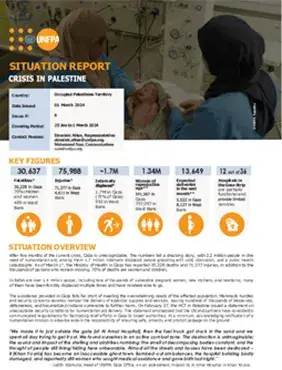After five months of the current crisis, Gaza is unrecognizable. The numbers tell a shocking story, with 2.2 million people in dire need of humanitarian aid, among them 1.7 million internally displaced people grappling with cold, starvation, and a public health catastrophe. As of March 1st, the Ministry of Health in Gaza has reported 30,228 deaths and 71,377 injuries, in addition to the thousands of persons who remain missing. 70% of deaths are women and children.
In Rafah are over 1.4 million people, including tens of thousands of vulnerable pregnant women, new mothers, and newborns, many of them have been forcibly displaced multiple times and have nowhere else to go.
According to the JHU / LSHTM Gaza Scenario-based Health Impact Projections Project2, the escalation scenario over the six-month period from February to August would reverse over a quarter of a century of progress. This regression would set back maternal mortality to levels last seen in 1995, neonatal mortality to levels last seen in 1998, and stillbirth mortality to levels well before 2000.
In the West Bank, movement restrictions continue to impede access to health and social services, the movement of ambulances, and the delivery of humanitarian assistance.
UNFPA has been actively engaged in the humanitarian response to support the reproductive health and well-being of women, girls, and adolescents. This included delivering essential medical supplies, medicines and equipment to obstetric facilities and field hospitals to assist with clinical deliveries, STI treatment, obstetric surgery, and care for severe complications during childbirth. Additionally, UNFPA, in collaboration with partners, provided antenatal and postnatal care services to pregnant and lactating women at non-formal shelters, advocated for emergency health care services for Clinical Management of Rape with plans to provide post-rape kits and capacity building to health workers, distributed dignity kits and menstrual health management kits and cash assistance to women and girls to maintain their dignity and hygiene and safeguard their menstrual health, and provided psychosocial first aid sessions to thousands of displaced women, girls and adolescents, reaching IDPs across various locations in Gaza, as well as through Shubbak Il Shabab helpline.


